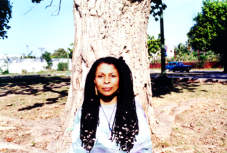Assata Shakur: Radical, Woman, Exile, Mother

(photo from www.afrocubaweb.com/photopages/assatagallery.htm)
Assata Shakur: Radical, Woman, Exile, Mother

(photo from www.afrocubaweb.com/photopages/assatagallery.htm)
ASSATA SHAKUR is an African-American woman. She is
a social justice
activist, a poet, a mother and a grandmother. She has lived in Cuba
since the early 19XOs.
During the heady days of the 1960s and 1970s, she found herself a victim
of
both racial profiling and political targeting. After being spotted
on the New
Jersey turnpike on May 2, 1973, because she is black, it was discovered
that
she and her two companions were known members of the Black Panther
Party and
the Black Liberation Army. Like Martin Luther Ring, Jr. Malcolm X,
Leonard
Peltier and many members of the Civil Rights and American Indian Movements,
Assata and her companions had been watched, their- phones tapped, their
families monitored, their organizations infiltrated, and widespread
disinformation
campaigns waged against them. They were like many activists of
the day -targets of the FBI's Counter Intelligence Program (COINTELPRO)..
In
fact, Assata was wanted, not for anything she had actually done, but
for a
variety of crimes that government and state officials were trying to
pin on
her. This was common in the 1970s: discredit the voice of activists
by
painting them as criminals, trumping up indictments, tying them up
in courts and if
possible jailing them. In the mid 1970s, The Church Committee of the
Senate
Select Committee to Study Government Operations and the Domestic Intelligence
Subcommittee, headed by Senator Walter Mondale, provided incontrovertible
documentation of a government sponsored conspiracy against the civil
and human
rights of all sorts of political activists.
THUS ON THAT DAY IN MAY Assata was a marked woman.
And after police stopped
them, a shoot out occurred. When the smoke cleared one police officer,
and one
of Assata's companions, Zayd Shakur lay dead. Assata, shot in the back
and dragged from the car, lay wounded. only belatedly taken to the
hospital,
Assata was then chained to her bed, tortured and questioned while injured.
In fact,
she never received adequate medical attention even though she had a
broken
clavicle and a paralyzed arm. Nonetheless, she was quickly jailed,
prosecuted
and incarcerated over the next few years for the series of trumped
up cases.
interestingly, in five separate trials, and with largely white juries,
charges
were dismissed because of lack of evidence or she was acquitted of
all charges
ranging from bank robbery to murder. As the manager of one bank said
at trial
;- she is just not the one who robbed my bank. only in the final trial
in
1977, where she was charged with the Turnpike killings, was she found
guilty. This
even though forensic evidence taken that day showed that she had not
tired a
weapon. She was sentenced to life + 33 years in prison. In 1979, and
after
nearly six years behind bars, she escaped from Clinton Correctional
Facility
for Women in New Jersey and some time later emerged in Cuba where she
applied
for and received political asylum. Since being in Cuba. she has continued
her
college education, published an autobiography, and writes on global
issues
facing women, youth, and people of color.
DURING THE 1990S, rightist politicians and police
bodies - this time in
conjunction with conservative members of the Cuban-American community
-
reinvigorated their attempts to pursue Assata Shakur. They did this
even
though Assata has not tried to re-enter. the United States and is,
according to
international law, a political exile who should be left alone. Linking
"fear of crime" rhetoric with anti-Cuban sentiment, New Jersey governor
Christine
Todd-Whitman issued a bounty which is now up to $ 100,000, on the head
of
Assata Shakur. She even went as far as to announce her bounty on Radio
Marti,
the US government radio station which beams anti-Castro propaganda
into the
Caribbean. To do such a thing put Assata in danger because it is tantamount
to encouraging any opportunists to kidnap and/or kill her for pay.
In
addition, in 1998, Congressmen Franks and Menendez from New Jersey
and Ros-Lehtinen and
Diaz-Balart of Florida introduced and got passed - House Resolution
254 -
which calls for- the Cuban government to extradite Assata Shakur as
a condition to
normalization. US-Cuba Relations. Interestingly, while Assata and Cuba
are
portrayed as ''criminal",. a terrorist bombing campaign - thought to
be
sponsor-ed by ultra-rightist forces in the United States - has been
launched
against Cuba, killing and injuring Cuban citizens and foreign tourists
alike.
Hands Off Assata Campaign/Global Exchange
P.O. Box 438731
Chicago, IL 60643